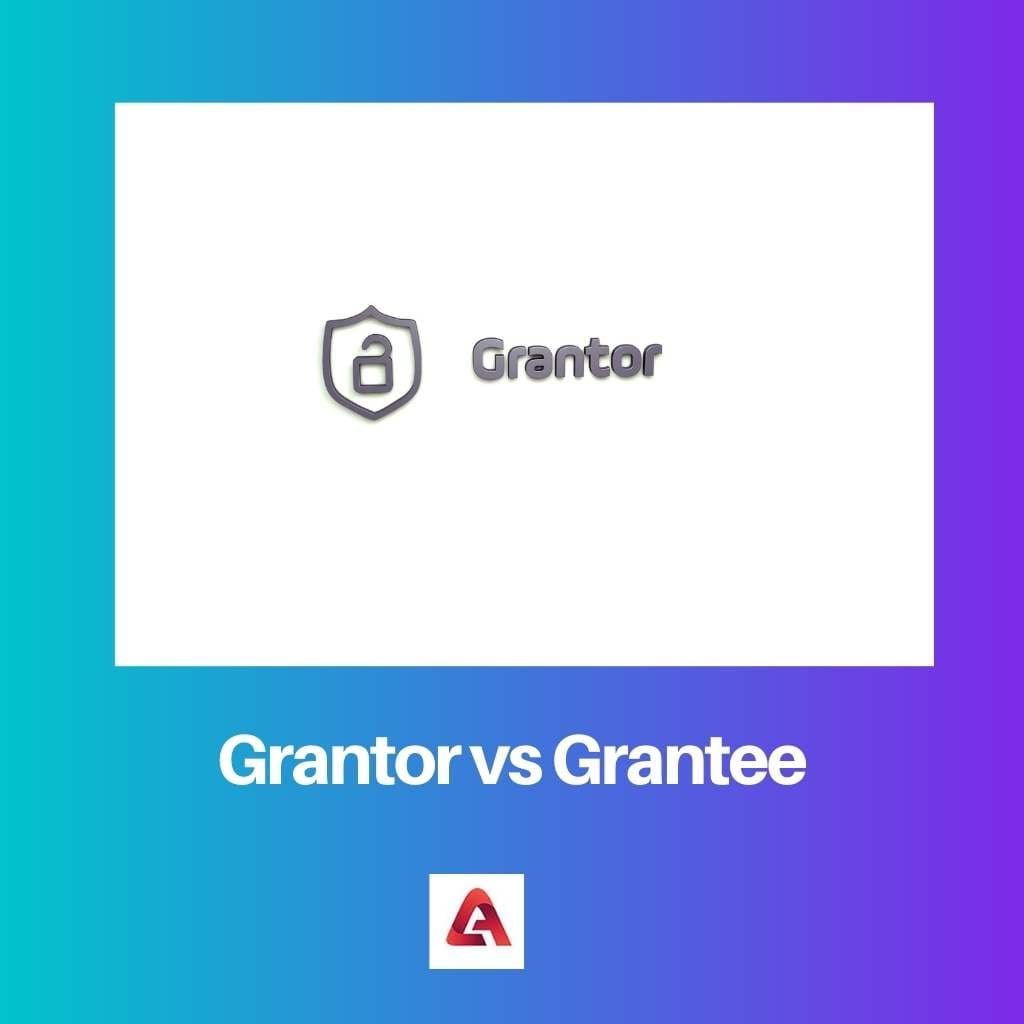Every domain and industry undergoes transactions. In every transaction of the fund, grant, asset, or trust, two parties are involved. Several legal associations depend upon the type of transaction.
One party provides or gives, and the other party receives. These two parties are commonly called grantor and grantee.
Key Takeaways
- A grantor is a person who transfers property or assets to another person or entity.
- A grantee is a person or entity who receives property or assets from the grantor.
- A grantor is a person transferring the property, while a grantee is a person receiving it.
Grantor vs Grantee
The difference between a grantor and a grantee is that grantor is the person who can transfer the interest or the ownership of a trust or assets to a person, group, or entity, while a grantee is a person who acts as a recipient of that fund, grant, asset, real estate property or trust transferred by the grantor.

The grantor is the owner of the trust or asset and is ready to transfer the position of title to other identified beneficiaries. The grantor has the right to revoke and modify property or assets according to his/her wish and will.
The grantor can also be called the trustor, first-party, lessor, or patron. The grantor can manage the trusts themselves or hire other trustees to do the same.
On the other hand, the grantee is the buyer or the beneficiary of the trust or asset. The grantee receives the title of the property given or sold by the grantor.
Grantees have no right to modify or revoke the deed, trust, or asset unless bought and gained a complete position. The grantee is also called the second party, recipient, or inheritor, depending upon the domain of transfer.
Comparison Table
| Parameters of Comparison | Grantor | Grantee |
|---|---|---|
| Definition | A grantor can be referred to as any individual or entity that can create trust out of their assets. | Grantee is referred to the person who receives funds, grants, or property. The grant can be in the form of a scholarship, real estate, or other assets. |
| In real estate | Grantor provides and passes property in or by deed | Grantee buys and receives the property |
| In General, warranty deeds | Grantor provides a series of promises that are legally bound | Grantee receives the highest level of protection and warranty |
| In investment | Grantors are investors who legally transfer or sell short a call or put option of a stock or other investments. | Grantee is the recipient of stock options |
| Other names | The first party, settlor, trustor and trust maker, lessor, landlord, owner, patron | A second party, recipient, buyer, beneficiary, legatee, devised, inheritor, the claimant |
What is Grantor?
The grantor can be referred to as any individual or entity that can create trust out of their assets. The grantor can also function as a trustee.
Some other common functions and names of a grantor are settlor, trustor, and trust maker. The grantor gives the assets to the identified beneficiaries.
Whenever a person sells out option contracts, the premium earned by the grantor is referred to as the option’s writer. Depending upon the trust, the grantor can act as a beneficiary and trustee or both.
The grantor provides all the assets in the trust. The other associated property and funds are under the ownership of the grantor.
The management of the property in the trust is also under the grantor. Many trusts are non-grantors, and the control of the assets is relinquished.
In this case, the trust functions as an entity of separate tax. The grantor is also called the settlor or creator, as it can create trust.
The transfer of ownership of the trusts or assets of the grantor is done through “deeds.”
The trusts of the grantor can be revocable. The grantor has the right to modify the terms of the trust. The grantor can even revoke the trust altogether.
No other encumbrance can be made on the property by other parties who have not been disclosed by the grantor. The grantor appoints the trustee to make decisions and manage the trust and the assets.

What is Grantee?
The grantee is referred to as the person who receives funds, grants, or property. The grant can be in the form of a scholarship, real estate, or other assets.
The grantee gets the ownership of the asset from a grantor. The grantee can be a recipient of any legal documents like deeds or others.
Depending upon the type of legal document, the limitations of every document or deed are different and placed on the rights and interests.
The term grantee can be used in various content and across different domains, institutions, and industries.
For example, in academics, a grantee can receive grants or scholarships; in real estate, a grantee would refer to the entity that takes title to the purchased property.
In investing, the grantee word refers to the recipient of the stock options.
Not every deed renders power to the grantee. Like in real estate, a deed called quitclaim has no warranty on the status of the title and can leave the grantee powerless if any title defects arise.
But there are special warranty deeds that assure the grantee that the grantor owns the asset.
The grantor-grantee index shows a complete record of the real estate that is transferred between the grantor and the grantee. It has detailed information about the property’s release and transfer of ownership.
The grantee is also called the buyer.
Main Differences Between Grantor and Grantee
- A grantor can transfer an asset’s interest or ownership rights to another person or entity while a grantee is the recipient of those assets transferred.
- A grantor has the right to revoke the trust or asset, while the grantee does not have any right to revoke.
- Grantor is the respondent, while the grantee is the petitioner.
- On legal documents, the grantor is at the bottom of the document, while the grantee is at the top of the document.
- The grantor is the seller (in deeds) and borrower (in mortgages), while the grantee is the buyer, lienholder, or new owner.